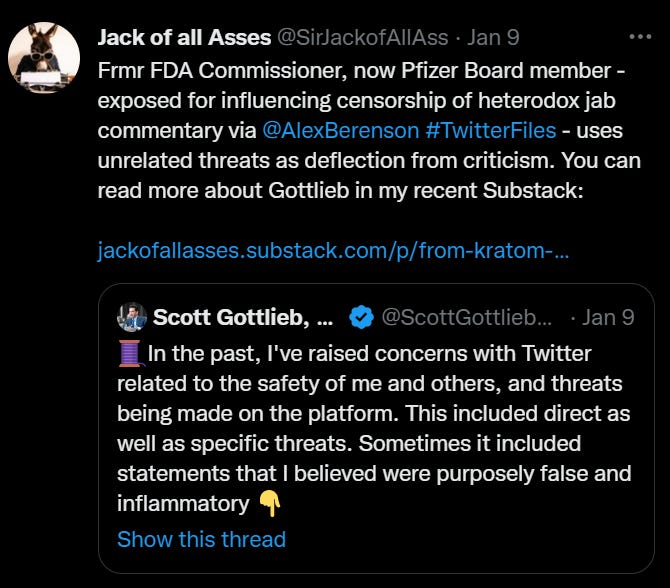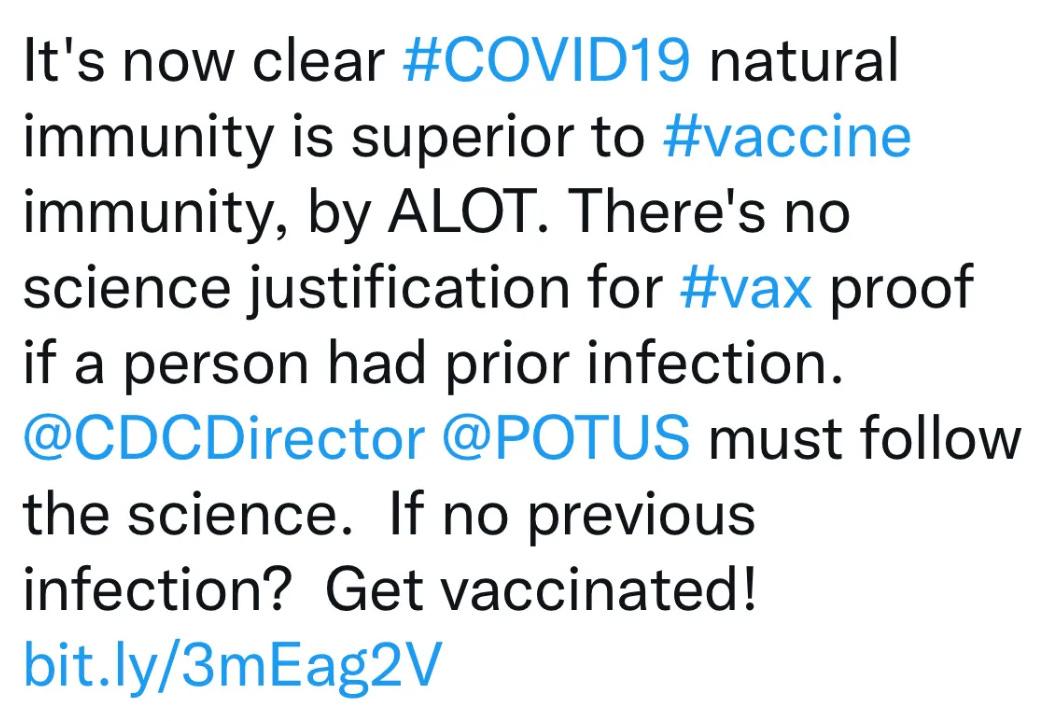I recently wrote an article exploring how my research into Kratom left me deeply skeptical of the FDA, our healthcare apparatus, and some legacy medias. It’s my most successful piece as “Jack” to date, bringing in scores more views and followers than my previous best. The story briefly touched on Kratom and the corruption that I witnessed during my investigation some years ago, as well as Scott Gottlieb, the then-Commissioner of the FDA.
Incidentally, Gottlieb recently came under fire for being exposed for influencing the censorship of unsanctioned commentary on Twitter. His hilarious reaction was a red herring attempt at garnering pity by sharing unrelated threats that he had asked to be removed, but I digress.
That’s definitely not Chekhov’s Gun…
Anyway, in this piece, I will delve a bit deeper into Kratom and the FDA’s approach, demonstrating an apparent example of the misinformation bubbling from this special-interest capture.
I’m also gonna pick on Mayo Clinic.
But first…
Kray-What Now?
Kratom is the market name for the leaf of Mitragyna Speciosa (Rubiacaeae), a Southeast Asian evergreen tree sharing the family of Coffee.
It has a long history in the region for use of stimulation and pain relief. Traditionally, the leaves would be chewed by field workers to help with their daily labors, though it could also be made into a tea. Until recently, it drew a modest interest around the globe, often being sold as finely ground powdered-leaf in pouches or capsules, or in more potent liquid extracts.
The plant is currently federally unregulated, though its legal status does vary state to state (among other districts and cities).
Its proponents often over-sell its benefits, claiming it can help with everything from depression and ADHD to withdrawal cessation or even serve as a cure for other addictions. Many use it for pain relief, a sense of well-being, energy, and workouts, to name a few examples.
With that said, to be clear, my goal here isn’t to promote Kratom, but to expose dishonesty in the system.
In another life, I invested a great deal of time researching the Opioid Crisis, focusing on the subject since the early ‘00s, once the ramifications of Oxycontin and the Pill Mills became apparent. Despite this, I’d never heard of Kratom until around 2016-17, as articles began popping up in my feed about the FDA seeking a ban. Turned out they had been at it for years already, but this time it went a bit more viral.
According to Gottlieb and the FDA, it was a potential killer and it had to be stopped.
Maybe it’s my rebellious nature, but when the government wants to hide or block something from me, it always piques my interest.
Once I discovered the shady practices they were employing, I was hooked.
Wait, Don’t You Follow the Science?
The corruption of our regulatory bodies can’t be overstated — the pipeline between upper management and the private sector has been blatant for decades at the very least. We certainly see that with Mr. Gottlieb, who moved directly from FDA Commissioner, overseeing this attack on Kratom, to a cushy Board seat over at Pfizer.
No conflicts of interest there, of course.
To that point, maybe the fact that the pharmaceutical industry funds about 70% of the FDA’s budget should be a bit of a concern, not to mention The Scientific American’s exposé on how it manipulates the medias?
Nothing to see here.
I’m sure none of this explains why nearly a third of their passed-drugs are found to have safety concerns after reaching the market, or how a loophole led to years of the passing of unsafe devices.
Unrelated, but it’s also really great that Biden made it so they don’t have to test on animals before human drug trials anymore. I’m sure that is definitely in all of our best interests.
Hey, did you know the US is only one of two countries that allows direct advertising from the pharmaceutical companies to the general public? The industry spends nearly $6 billion a year to get their drugs in front of your eyes.
They spend $20 billion advertising to doctors.
Now, I said all of that to cement the extent of scientific rigor and intellectual professionalism we can expect from the FDA.
2023, FDA, Putting Public Health First, Colorized
Shockingly, however, in its efforts to shut Kratom down, the FDA didn’t follow the science.
Put simply, they broadly ignored any inconvenient studies that may demonstrate the plant’s potential, flubbed statistics and lied about facts (such as sharing false cause of deaths), and artificially amplified scare tactics around other common public health talking points, like Poison Control reporting (I’ll get to all of this in a minute).
Perhaps the most infamous examples of outright deceptive stats were when they considered a person who fell out of a window and another who died by a gunshot wound to the chest as Kratom deaths. In fact, of all the deaths reported at the time that I first researched this, I couldn’t find a single example where other, more pertinent contributing factors, such as Fentanyl, Heroin, and Alcohol, to name a few, weren’t also present.
“Shoulda Worn My Kratom Proof Vest…”
So, not only did the FDA want to ban Kratom, they were lying to do so.
To wit — even if we disregard questions of safety, value, or any interest of Kratom, this demonstrates a broader problem with the agency itself. If we can’t trust it here, can we trust it, say, with a mass scale release of “novel vaccinations”?
So, What’s the Deal with Mayo?
Given the monocultural response to Covid between governments, medias, and social media sites, it’s fair to say the discussion around Covid was stifled. Had we seen such widespread collusion around Kratom, I imagine I wouldn’t have investigated it in the first place, and indeed would probably be jabbed.
While I certainly did see a flurry of (mostly local) news outlets echoing the FDA’s narrative, there were some that broke ranks. Rolling Stone, for example, took a surprisingly neutral approach, platforming the contra-arguments of the AKA (American Kratom Association; the Kratom lobby that was founded in 2014) particularly in calling out the aforementioned flubbed numbers. You could find similar coverage over at The Huffpost. (Indeed, both touch on the claims I made above.)
Discourse is a necessary component to Democracy, of course, but this was particularly helpful in better understanding the deeper problem.
Yet, surprisingly, the more public face of the medical community was quick to lick the boots. Perhaps picking the clearest example, in 2019, Mayo Clinic published an article on the health concerns of Kratom. The piece is a treasure trove of information, presented all very matter-of-fact, and indeed, much of it is accurate for the time as far as I can tell, beyond the cost/benefit analyses.
The concern doesn’t arise with what facts are presented, but how they are. Much of the information is given without context, and with a very negative slant in its approach. It smacks more of fear mongering than neutral, scientific coverage.
“Honey, the Trailers are Starting!”
For example, the article claims that "Poison control centers in the United States received about 1,800 reports involving use of kratom from 2011 through 2017, including reports of death."
Poison control calls can occur over anything and are often overreactions. In 2020, 83% of poison exposures reported to U.S. poison centers were nontoxic, minimally toxic, or had at most a minor effect.
Likewise, 1,800 sounds like a lot until you consider that this is out of millions of users over the span of six years. It also helps to put that number into perspective: just between October 2010-September 2013, there were 5,156 calls over energy drinks.
In regards to Kratom, Mayo notes that, "Five of the seven infants who were reported to have been exposed to kratom went through withdrawal."
This is a strange statistic. Of course, any exposure of a child is terrible, yet no one thinks kids should consume Kratom, just like most people don't think they should be drinking Red Bull. And regarding the statistics on energy drinks above, 40% of those calls were for small children.
That’s 2,062.
“…And Ban Energy Drinks!”
They continue, "Kratom also adversely affects infant development. When kratom is used during pregnancy, the baby may be born with symptoms of withdrawal that require treatment."
So does caffeine, nicotine, alcohol, etc. This isn't an indictment of Kratom, it's an indictment of bad parenting.
They highlight a Salmonella outbreak a few years back, saying, "In addition, substances that are made from kratom may be contaminated with salmonella bacteria."
However, this obviously isn't unique to Kratom, and it ignores the AKA’s statement on their consistent effort to follow basic FDA standards for regulation, something the FDA appears to want to sidestep:
"The kratom community supports adherence to FDA product testing protocols that meet or exceed Good Manufacturing Practice (GMP) guidelines set by the FDA for dietary ingredients/supplements and support appropriate age restrictions and labeling guidelines outlining responsible use. The kratom community calls upon the FDA to use its existing regulatory authority to remove adulterated kratom products from the market and prosecute individuals or companies who produce or distribute dangerous adulterated kratom products."
Ironically, as long as you're not buying through some shady vendor, the imbalanced scrutiny Kratom received probably made it safer than your average alfalfa.
The Bottom Line
Now, here you may say, “Jack, you’re just cherry picking the little things, like optics, what about the risks listed? Isn’t this a dangerous opioid?”
The piece does makes some claims about side effects — which aren’t so much unlike other substances, like alcohol and nicotine — but much of this is still unknown and unsubstantiated. Perhaps the most glaring claim is that "... researchers who have studied kratom think its side effects and safety problems more than offset any potential benefits."
If this were true, why are there studies looking into the industry implications of Kratom’s Mitragynine and 7-hydroxymitragynine being utilized by Pharma, not only for the obvious pain relief potential, but even as a treatment for alcohol abuse disorder? There already is interest in patents for these compounds.
You can’t patent a plant…but you can ban it and patent a synthetic derivative. That’s not only feasible, it’s profitable!
Nevertheless, at the end of the day, the problem is the lack of conclusive research, and that goes both ways. As I said, I’m not here to defend Kratom, I’m just calling out bullshit. Still, much of the studies cited by Mayo Clinic have been contradicted. Whereas they claim Kratom appears to be “more potent” in animals as Morphine, one study found that “…morphine-like opioids carry an overdose risk of a thousand or more times greater than kratom,” while Johns Hopkins did a survey that found Kratom likely has a lower rate of harm than prescription opioids.
Obviously this isn’t conclusive either, but as Albert Perez Garcia-Romeu, Ph.D., notes, “There has been a bit of fearmongering … because kratom is opioidlike, and because of the toll of our current opioid epidemic.”
And that last bit is something else that Mayo chose to omit: While Kratom may act like an opioid, it actually isn’t one. And that word does hold weight in this era, even though it perhaps shouldn’t.
Did you know Imodium, the popular anti-diarrhea drug, is an opioid?
Better chill out, you indigestion junkies!
The Icing on the Cake
Still not convinced?
At the end of the day, as far as I can tell, the evidence is strong that the FDA isn’t only a captured agency operating in bad faith, but specifically approaching Kratom unfairly.
Nevertheless, if you need more, consider this:
After leaving his position as Commissioner, Scott Gottlieb tweeted his contentions with HHS rejecting his efforts.
Curiously, his interim-successor as FDA Commissioner, Dr. Brett Giroir, not only shot Gottlieb down, he further validated the concerns that I’ve raised here by calling out the FDA’s failure to make its case against Kratom:
Again, this is a man who held the Commissioner role of the FDA echoing everything I am saying here.
It’s a good thing he was only temporary, we can’t have actual medical sincerity in this vital position. Thankfully, we now have the return of Dr. Robert Califf, who appears, at least based on this Pain Focused page, to share Gottlieb’s agenda, not only with Kratom, but with CBD.
We gotta stop these people who find ways to treat their pain outside of big Pharma, don’tcha know?
Oh, I almost forgot! Remember when I mentioned at the top that Gottlieb came under fire for influencing the censorship of people on Twitter? Turns out there was one particular tweet that he found especially “corrosive,” that read:
And who was this anti-science, medically illiterate conspiracy theorist that the sitting Pfizer Board member pushed to be censored?
Why, none other than Dr. Brett Giroir, the then-acting Commissioner of the FDA.
Imagine that.














